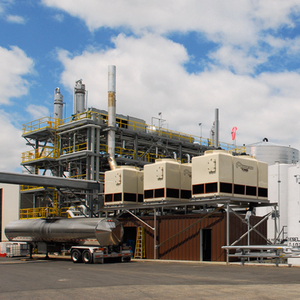More consolidation in biofuel industries expected this year

Photo: Renewable Energy Group Inc.
February 22, 2016
BY Ron Kotrba
Ocean Park Advisors says the North American biofuel industries saw a “dramatic” consolidation of players last year and, after just two months into 2016, all indications point to an even greater number of mergers and acquisitions this year.
Bruce Comer, founder and managing director of Ocean Park Advisors, said limited availability of capital will compel independent players in the advanced biofuels and renewable chemicals space to explore strategic collaborations or sales.
Earlier this month the largest player in the North American biodiesel sector, Renewable Energy Group Inc., announced a deal to acquire the 20 MMgy Sanimax biodiesel plant in Wisconsin, bumping up its number of active U.S.-based biomass-based diesel plants to 11.
Advertisement
“Our experience leads us to believe there will be an increased number of owners and boards of renewable fuel companies evaluating their options in 2016, if not testing the market for reasonable assessments of the value of their plants,” Comer said.
The ethanol industry is particularly ripe for consolidation, Comer said, noting the existence of 94 stand-alone plants with 5.3 billion gallons of production capacity totaling 36 percent of the ethanol industry’s domestic production capacity.
“With dampened expectations for profitability, mostly due to commodity prices and excessive production capacity, we expect most remaining nonstrategic players to explore exits this year,” Comer said.
Advertisement
Ocean Park Advisors pointed to two examples in the ethanol industry: Abengoa and Archer Daniels Midland Co. The firm noted Abengoa has begun marketing its global, first-generation ethanol assets due to financial distress at the Spanish parent company. Abengoa owns six ethanol plants in the U.S. with a combined capacity of 381 MMgy. “This could represent a challenge for the sector to absorb,” Ocean Park Advisors stated. For ADM, Ocean Park Advisors stated that the industry leader, with three dry mills and five wet mills totaling 1.7 billion gallons of annual production capacity, is evaluating its commitment to the ethanol industry due to the long-term outlook on sector profitability. This is evidenced by ADM’s announcement to conduct a strategic review of its dry mills.
In 2015, Ocean Park Advisors tracked 10 biofuels transactions worth an estimated $750 million to $850 million in value. The deals involved 13 plants with 888 MMgy of production capacity. In addition, there were another three acquisitions of advanced biofuels/renewable chemical companies. The firm has closed 21 biofuels transactions totaling more than 750 MMgy of production capacity in the past five years.
“If the number of willing sellers was the limiting factor over the past few years, then the number of capable buyers might be the limiting factor in 2016,” Comer said. “However, we believe this could be the year that creates a leaner and more strategic biofuels industry to carry American-made renewable fuels into the coming decades.”
Related Stories
CountryMark on July 22 celebrated the completion of more than $100 million in upgrades at its refinery in Indiana, including those related to soybean oil storage. The facility produces renewable diesel via coprocessing technology.
ATOBA Energy and Air Moana are partnering to implement scalable solutions for the supply of SAF. The collaboration aims to ensure long-term SAF availability while supporting local initiatives to develop sustainable fuel production in Tahiti.
Neste Corp. on July 24 released second quarter results, reporting record quarterly renewable product sales volumes despite weaker margins. SAF sales were up nearly 80% when compared to the first quarter of 2025.
Valero Energy Corp. on July 24 released second quarter results, reporting a profitable three-month period for its ethanol segment. The renewable diesel segment posted a loss, but the company’s new sustainable aviation fuel (SAF) unit operated well.
The IRS on July 21 published a notice announcing the 2025 calendar-year inflation adjustment factor for the Section 45Z clen fuel production credit. The resulting adjustment boosts maximum the value of the credit by approximately 6%.
Upcoming Events










